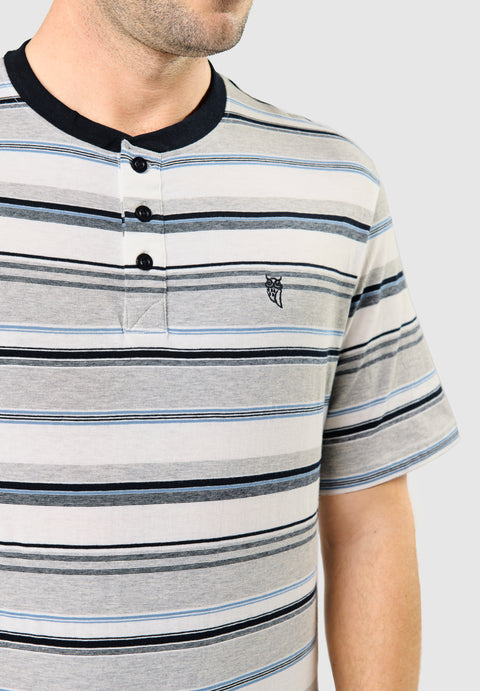When it comes to men's pajamas and sleepwear, we must know that there are many brands that manufacture these relaxing garments, with technology and natural, non-toxic organic woven, with an ethical vocation and in a sustainable way, to achieve the goal of creating the pajama for eco-friendly men.
It is estimated that the average man will spend a third of his life in pajamas, which is why during sleep and when the body rests, it performs its most important recovery and healing processes; this is when the appropriate attire is required, one that does not contain toxic chemicals involved in its composition.
Whether they are looking for comfortable standard sweatshirts, elegant nightshirts, or loose and flowing nightgowns, the focus should be towards ethical, sustainable, and organic pajamas and sleepwear; that is, that they are eco-friendly.
Environmentally Respectful Manufacturing
This has been a topic of discussion and debate worldwide. The processes involved in textile creation, especially those that are high-performance, are often quite harsh on the environment, accumulating and leaving residues, using a lot of water, chemicals, and energy.
The task is to look for brands that use more ecological processes that reduce their environmental impact. The right thing would be to focus on choosing sleepwear created under a fair labor practice and ecologically responsible environment. Among the natural origin organic woven that offer a variety of eco-friendly garments, you can find:
Hemp
Nowadays, and due to greater environmental awareness, interest in hemp fibers is increasing. It should not be forgotten that hemp grows almost everywhere, from Norway to Ecuador; moreover, this noble plant does not need pesticides and helps in the fight against pollution. Hemp woven is made from the inner bark of the industrial hemp stalk.
The look and fresh feel as well as the general characteristics of this clothing are very similar to linen, ideal for a good pajama. They are durable and washable fibers, with antimicrobial capabilities, besides helping the skin to breathe very well. Because hemp fibers are somewhat rougher, they are more frequently used for outerwear, protective clothing, men's pajamas, socks, jeans, among others. In recent years, textile factories have been dedicated to developing finer hemp woven, useful for shirts, blouses, summer clothing.
Like bamboo, hemp clothing has protective qualities against UV rays, that is, it protects from the sun. This clothing made from this fiber is a considerable opportunity to take advantage of the benefits it offers when worn for as long as possible.
Organic Cotton
This noble fiber, one hundred percent natural, is generally understood as cotton and is grown in subtropical countries such as Turkey, China, the USA. From non-genetically modified plants, which must be grown without the use of synthetic agricultural chemicals such as fertilizers or pesticides. It has the fabulous particularity that organic cotton production promotes and improves biodiversity, as well as improving biological cycles.
In some producing countries, like the United States, cotton plantations must comply with the regulations required by the National Organic Program (NOP) of the USDA to be considered organic. This way, there is certainty that they are complying with the correct and legally permitted practices for pest control, cultivation, fertilization, and organic crop management, avoiding contamination and deterioration of fertile lands.
On the other hand, conventional cotton, the one grown with the help of chemical agents, covers about 2.5% of the world's cultivated land but uses 16% of the world's insecticides; more than any other major crop.
This fact brings terrible environmental consequences derived from the high use of chemicals in non-organic cotton cultivation methods. High levels of agrochemicals are used in cotton processing, contaminating the air and surface waters. The residual chemicals used in its cultivation can irritate consumers' skin.
Angora Wool
Angora wool is a unique natural fiber, particularly fine and light, but extremely warm. This fiber is especially comfortable to wear on the skin, especially in winter and a much warmer pajama. It has the particularity of having many small air chambers inside the wool that act as a kind of insulating pads and store warm air on the body.
If cold air comes from outside, it is kept away from the body and makes the body's heat remain inside. The effect is similar to double strengthening in insulated windows. Angora wool is therefore many times warmer than sheep wool, even in summer when this fiber ensures a pleasant climate on the skin.
If angora is used in the rain, the skin will hardly get wet due to the high oil content that the fiber has, which prevents water absorption. It keeps the skin dry, not only when exposed to external moisture but also when sweating. In short, pajamas made with this fiber always ensure a dry and pleasant climate sensation.
Linen Woven
Linen is a woven made from the fibers of the flax plant. The production process of this fiber is laborious, but it is a very absorbent fiber and has a high value due to its exceptional coolness and freshness in warm climates. There is a wide variety of garments made with this fiber, from aprons to, of course, men's pajamas.
Textiles with a linen woven texture, even when made from cotton, hemp, and other fibers different from linen, are also generally called "linen." The collective term "bed linen" is still often used generically to describe a class of bed, bath, table, and kitchen textiles traditionally woven or woven from linen. In the past, "bed linen" also referred to lightweight underwear such as pajamas.
Silk
Pajamas made with this spectacular fiber are generally associated with luxury and eccentricity; however, it should be clarified that silk is a naturally very healthy option. In short, silk pajamas, despite the stereotype in which they are classified, are healthier for human skin than cotton, linen, wool, or synthetic clothing.
Silk is a natural product and, being natural, the human body responds much better to silk than to synthetic products. It is a fiber that aligns with the body's needs and works in unison to help achieve what is really wanted and needed: a deep and satisfying sleep.
It is breathable and comfortable, possessing natural properties that remove moisture from the body to keep it cool and comfortable throughout the night. This makes it an excellent choice for anyone who suffers from night sweats or hot flashes. Additionally, silk is also a great woven in winter, especially if you want to feel warm without being overwhelmed by heavy blankets. Silk pajamas feel so light that it is almost impossible to believe they can effectively protect against the cold.
Visit our website El Búho Nocturno where you will find the ideal pajama.

